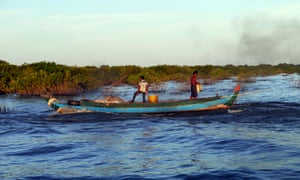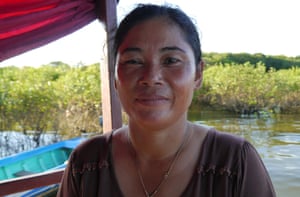Background:
Indochina Report (October 1984)
Part II: Vietnamization of the Economic Framework (continued)
The Unequal Exchange
It is within this new institutional framework that the Vietnamese are asserting their hold over the economy and future of Kampuchea. Fisheries, rubber and rice are the three main sectors affected by what should be termed theUnequal Exchange between Vietnam and Kampuchea.
 |
| Fishermen at work on Tonlé Sap lake, Cambodia. All photographs: Sam Jones for The Guardian |
Net loss: fish stocks dwindle in Cambodia's Tonlé Sap lake
The Guardian | 1 December 2015
Despite the creation of a 200-hectare conservation area, fishing
communities on south-east Asia’s largest freshwater lake fear their way
of life is slipping away
Out
past the floating villages, the daytrippers and the mangrove arcades,
the brown waters of the Tahas river open into a vast, dull green lake
fringed by forest and a seemingly endless horizon.
Silhouetted by a sinking afternoon sun, distant figures fish from
small boats under a blue sky streaked with low cloud. It is the kind of
weather that both tourists and Savon Pen prefer.
“Sometimes you look up at the sky and it’s gloomy and I worry that the boat will capsize,” says the 42-year-old fisherwoman.
“The wind blows them over and when the boats sink, they go straight
to the bottom of the water. Every year, people die.” Over the past few
months, two people from her community have drowned.
Tonlé Sap lake is many things to many people: a Unesco biosphere reserve since 1997;
a wetland that supports the livelihoods of more than 1.2 million
people; a tourist attraction; and the source of more than a third of all
the protein eaten by Cambodia’s 15 million people. In the rainy season, its area can swell from about 2,700 sq km to 16,000 sq km.

Savon Pen, 42, a fisherwoman from Kampong Phluk commune
But to Savon Pen, the largest freshwater lake in south-east is a treacherous but necessary workplace, one on which she and her husband depend to survive and to feed their six children. A good day’s work – which means spending 14 hours on the water to reach the far grounds where the fish are biggest – will net them between $8 (£5.30) and $16. From that, they will have to provide for their children, buy fuel and maintain the boat.
“It’s very difficult because if we don’t catch fish, we can’t put
food on the table for our children,” she says. “There are times when I
have to take the risk and go out even though I know it’s dangerous.”
Until three years ago, life around the lake was very different.
Before then, much of the fishing was divided up into government-approved
lots worked by commercial vessels, leaving many local people excluded.
In March 2012, the Cambodian prime minister, Hun Sen, ordered an end to the lots and opened up the waters to those living along its shores.
Although the move was well received by local communities, it has
raised fears that unrestricted access could destroy fish stocks. In a
bid to safeguard the lake’s population and diversity, an EU-funded programme has established a 200-hectare (494-acre) fish conservation area (FCA) close to the Kampong Phluk commune, which is home to nearly 3,900 people.

A boat chugs through Kampong Phluk commune, close to Tonlé Sap lake
According to the local community fisheries, the FCA is paying
dividends: its deputy chief claims that only 1% of the fishing in the
area is illegal, compared with 30% across the whole commune.
But despite its success, some local fisherfolk worry it may be too
little, too late. Vey Kuang, who has lived in Kampong Phluk for all of
her 54 years, says the fish population has dwindled drastically over the
past 30 years.
“When I was 18 or 19, there were a lot more fish than there are today,” she says.
“Back then, if we wanted to go fishing, four of us could catch the
fish with our bare hands. There were a lot of tree branches in the water
then to attract fish, but they have all gone now, so the fish
population has decreased and some species are no longer found.”

Vey Kuang, 54, who has lived and fished at Tonlé Sap lake all her life
The forests surrounding the lake have been denuded for decades
because people rely on wood and charcoal for fuel, but Vey Kuang
believes that climate change is also affecting the seasons and the fish.
“The weather is getting hotter and now even the rainy season is as
hot as the dry season,” she says. “November is meant to be a cool month
but this year, it’s hot.”
Ning Nee, the community’s commerce chief, agrees: “We have seen an
increase in heat. It’s hotter now and we are urging people to plant
trees.”
Vey Kuang has noticed other signs of climate change. She points to
the water below the stern of the boat she is sitting on and says her
mother has told her that, in her lifetime, the level of the lake has
never been so low. What’s more, she adds, the lake has started to smell,
which shouldn’t happen given the fresh downpours of the rainy season.
“I hope the fish conservation area will help,” she says. “But I am
very worried about how things will be for my grandchildren. If there are
no more fish, we’ll have to send people from the community to the city
and then the young people will go and we, the old people, will be left
here selling fish and vegetables.”
Others in the community are more ambivalent about the changing times
and are eyeing ecotourism as a way to increase their income. Many
already supplement their fishing activities by rowing tourists around
their stilted houses and out into the lake.
Even the most vulnerable people in the village – single women without
boats of their own – can earn a couple of dollars through the
rotational scheme. Tourists are charged $5 for a small boat, of which $2
goes to the boat owner, $2 to the rower and $1 back to the community to
fund conservation efforts.

A fishing boat in Kampong Phluk commune
Savon Pen is delighted at the extra income and unfazed by the
tourists who cruise the river and study its people and wildlife through a
camera lens.
“I’m very happy to have my picture taken,” she says. “I hope they will share the pictures and then more people will come.”
Although some of her neighbours fear that the changing weather could
soon bring an end to a way of life that has endured for generations, and
disperse families and communities, Savon Pen is resolutely
unsentimental about the future.
“If I could choose, I would quit fishing and do tourism. Tourism isn’t difficult – fishing is,” she says.
“I’d like to live in a town because I’ve been there and I’ve seen
that people there can support themselves in different ways and have time
to celebrate holidays with their families.”


No comments:
Post a Comment